- Home
- Martin Amis
Experience: A Memoir Page 3
Experience: A Memoir Read online
Page 3
† Which passage, you fool? The ‘said novel’, indeed … But I mustn’t heckle my past self too raucously. I have made no changes in this armpit-scorching archive, except to protect the innocent. And the really generous reader will concede that I was innocent too.
Women and Love — 1
We sat in high-bourgeois splendour, my father and I, in the house outside Barnet, having a pre-lunch drink and talking about his first published story, ‘The Sacred Rhino of Uganda’ (1932: he was ten). Now it was 1972, and he had just turned fifty, an occasion he marked with a poem: ‘Ode to Me’ (‘Fifty today, old lad? / Well, that’s not doing so bad …’). He was then at the height of his prosperity and productiveness; and his marriage to Jane was still cloudless — or so, at any rate, I believed. ‘The Sacred Rhino of Uganda’:
— It was awful in all the usual ways. And full of false quantities. Things like: ‘Raging and cursing in the blazing heat …’
— What’s wrong with that? I mean I can see it’s old fashioned …
— You can’t have three ings like that.
— Can’t you?
— No. It would have to be: ‘Raging and cursing in the … intolerable heat.’
You couldn’t have three ings like that. And sometimes you couldn’t even have two. The same went for -ics, -ives, -lys and -tions. And the same went for all prefixes too.
After lunch I went up to my room and spent a few hours with the novel I was about to submit for publication. Later, over a pre-dinner drink, I said,
— I’ve been going through my book. And guess what. It’s doggerel.
— I’m sure it’s not.
— It is. It’s all ‘the cook took a look at the book’. It’s like a nursery rhyme. Hickory dickory dock, the mouse ran up the clock.
— You’re exaggerating.
Yes, but I did revise the novel yet again: making war on the -ings and the -ics, the pre-s and the pro-s.
It was the only piece of literary counsel he ever gave me. And, of course, he had never expressed any desire that I should pursue the literary life, despite all the evidence that I had such a life in mind. I attributed this to sheer indolence on his part, but I now think he was obeying a parental instinct, and a good one. Five years later, when I was back-half editor of the New Statesman, a well-known writer visited me in my office with his son. The boy (seventeen?) wrote poems, it was explained, and the father wanted me to look at them; perhaps I might accept one or two for publication. I was ten years older than the poet. I sympathised with him. But I think I pointed out immediately that nobody writing in English had ever done anything of much merit before the age of about twenty (no, not even poor Thomas Chatterton, ‘the marvellous boy’, who was seventeen — and destitute, after early successes — when he poisoned himself with arsenic). The well-known writer gently persisted. And I thought, all right, it’s conceivable: Rimbaud was the same age when he wrote ‘Le Bateau Ivre’. I looked at the son’s poems. And I sent them back to him with a letter saying that I thought they were promising, and (equally truthfully) that I would be happy to keep an eye on his stuff as it came along …
In the arts, when the parent invites the child to follow — this is a complicated offer, and there will always be a suspicion of egotism in it. Is the child’s promise a tribute to the superabundance of the father’s gift? And historically what long odds you face; there’s Mrs Trollope as well as Anthony, and Dumas père et fils, and that’s about it. What usually happens is that the child is productive for a while, and then the filial rivalrousness plays itself out. I think literary talent is strongly inherited. But literary stamina is not.
Quite soon afterwards I heard that the well-known writer and the poet son had fallen out. This was the beginning of a long rift. The last poem the son sent me was about the father: a lightly versified tirade.
I can’t imagine what my adult life would have been like if any such breakdown had afflicted Kingsley and me. There is murk, there is poor visibility, in the motives of literary ambition — nostalgie, acidic isolation; and there is already quite enough going on between fathers and sons. I felt the squeeze of immediate hurt when Kingsley, who claimed to have liked my first novel, said he ‘couldn’t get on’ with my second. But there it was: I knew him to be incapable of equivocation or euphemism on any literary question. And he had an apologetic, almost imploring look in his eyes when he spoke … (And he didn’t like Nabokov either, or anybody else, except for Anthony Powell.) Otherwise we had fights and rows and many hot exchanges, but never anything that wasn’t cleared up the following day. Only once, when I was turning thirty, did I find myself entertaining the prospect of a froideur. Kingsley — out of fondness for her predecessor — had spoken brusquely of the woman I had just fallen in love with. ‘What did you think of her?’ I asked on the phone the day after I presented her to him, expecting a paragraph of ceremonious praise — a sonnet, a psalm. ‘I don’t mind you bringing her to the house,’ he said, ‘if that’s what you need to know.’* My roused feelings were roused further. For a few seconds a rift seemed attractively romantic, like a duel at dawn. I remember delectating it, this froideur. And then I dismissed it, convulsively, like an expectoration. Hoik. Phthook! Plus the thought: Don’t ever consider that again. I was turning thirty and he was contemplating sixty. We were approaching the hinge of age, and would soon be needing each other in complicated ways … My father never encouraged me to write, never invited me to go for that longshot;* he praised me less often than he publicly dispraised me; but it worked.
With my own children I intend to be more liberal in my praise. Although I like the writer’s life — day to day — much better than Kingsley did, there will be no encouragement for my children. No encouragement. None.
It is mid-November 1973, about fifteen months after the ‘doggerel’ conversation, and that first novel is about to appear.† The event passed in what now seems to be improbable tranquillity. No interviews, no readings, no photo sessions. And no party — or no publisher’s party. It was a first novel, admittedly, but there wasn’t any outside activity when my second novel was published either, or my third. That’s the way it was in those days. A minority-interest field. All quiet.
No official party, then, in 1973 — a quarter of a century ago, almost to the hour, as I type these words. But I had a party anyway.‡ I was living in a small but fancy maisonette, with Rob and his girlfriend Olivia. I couldn’t afford it, and Rob, who had sunk the whole of a small inheritance into the lease, couldn’t afford it either. The arrangement would collapse very soon: within a month or two I would find myself in a dust-furred bed-sit in Earls Court. But we had a great time that night. My brother Philip contributed a magnum of whisky. And my sister was there and my father was there. I remember him coming up the steps to the sitting-room with that glint of maximum anticipation (he looked forward to treats of any kind with youthful, childish intensity, the result, I suppose, of the eventlessness — and siblinglessness — of his childhood and youth). Kingsley’s old friend, the Sovietologist and poet Robert Conquest, was there. And Christopher Hitchens was there, handsome, festive, gauntly left-wing. And Clive James was there, with his biker’s build and beard and hairdo, not that long off the boat from Australia and ‘madly excited’ (like Charlie Citrine in the Bellow novel) to have reached the city of words.
What can I tell you? It was the Seventies: the joke decade. Clive wore denim hipsters and a poacher’s jacket. Hitch would have had on his controversial patchwork jeans with the stain like a dull sovereign just to the right of the warped fly (I think he acquired them, or maybe disposed of them, by barter in Moscow). I, like Rob, was almost certainly sporting a dagger-collared flower shirt and green velvet flares — crushed velvet, too, so that their non-threadbare sections gave off a sickly sheen. Even Kingsley’s trouser cuffs had an inch or two of extra play. It amazes me, now, that any of us managed to write a word of sense during the whole decade, considering that we were all evidently stupid enough to wear flares. That night Rob an
d Olivia gave me a blue T-shirt with the title of my novel embossed on it in purple capitals. I slipped into this for the rest of the evening. And there stood a copy of my book propped on the little TV.
It was a shocking rout, and ended some time between four and five. Those of us who met up for lunch the next day looked and felt like extras in the galactic-speakeasy scene in Star Wars (itself still a thing of the future: four years distant). Several new romances started on that night, the Hitch and my sister Sally, for example, repairing to the nearby Cadogan Hotel. At dawn Rob and Olivia went to bed together, upstairs, and I went to bed alone, downstairs. I was not in love. In fact I couldn’t seem to get a girlfriend of any kind. I still dream about this relatively brief period of my life: dreams imbued with feelings of disconnectedness, unattachedness — and of course unattractiveness. Profound unattractiveness. When you’re without a woman, it is astonishing how quickly you become loathsome to yourself. It is astonishing, too, how quickly this news gets around; every woman you meet seems to know all about it … Things would eventually look up — in a way that even then seemed completely spectacular. Early in the summer of 1974 I would be in the Cadogan Hotel myself, having an introductory and gently inquisitorial tea with the parents of the teenage Tina Brown. But I had my Earls Court time to get through first, days, weeks, months, without a woman.
— Get your hair cut, said Kingsley doggedly. Get your hair cut.
There was no one else in the room, but he wasn’t telling me to get my hair cut. Over the years Kingsley must have told me to get my hair cut ten or twelve thousand times. But he wasn’t telling me to get my hair cut. The year, now, was 1984. I was newly married to an American academic called Antonia Phillips, and there was a child on the way. I didn’t need to get my hair cut.
— Get your hair cut … Get your hair cut.
This suggestion was being offered to the television set, more particularly to the actress Linda Hamilton every time she appeared on screen. We were watching a tape of The Terminator (again). An old science-fiction hand, Kingsley was a great fan of The Terminator, and seven years later he would make no secret of his admiration for Terminator 2 (‘a flawless masterpiece’), which I took him to at the Odeon, Marble Arch.
— Get your hair cut … Get your hair cut.
In Terminator 2 (1991) Linda Hamilton wore her hair up or back. In The Terminator, on the other hand, she was decidedly full-maned, as people were then, in 1984.
— Get your hair cut … Get your hair cut.
— I hope you’re going to stick with this, Dad, I said. I hope you won’t weaken if anyone accuses you of being boring or repetitive.
— Get your hair cut … Get your hair cut.
— Because there are some who might point out that this film has already been made. Even if Linda Hamilton could hear you, and even if she thought it was a good idea, she couldn’t go back and get her hair cut.
— Get your hair cut … Get your hair cut.
— But don’t listen to them, Dad. You’ve set your stall out. Now it’s up to you to see this thing through.
— Get your hair cut … Get your hair cut.
After a while, when the action started and it became clear that Linda Hamilton wouldn’t have time or leisure to get her hair cut, Kingsley stopped telling her to get her hair cut.
Jane left Kingsley in December 1980. That was nearly four years ago, and there’d been nobody else. As I was getting ready to go I said,
— How are you really, Dad?
— Oh, all right … But you know it’s only half a life without a woman.
— Is it?
I was surprised and in a way delighted to hear him say this. It sounded uncharacteristically forgiving, and I had thought him more chronically embittered. Embittered for the long haul. It wasn’t so much his manner or the things he said. It was evident in his novels — specifically in the anti-romantic curve leading from Jake’s Thing (1978) to Stanley and the Women (1984), which appeared to cancel any hope or even memory of comfort from that quarter. I wasn’t making the elementary error of conflating the man and the work, but all writers know that the truth is in the fiction. That’s where the spiritual thermometer gives its reading. And Kingsley’s novels, around then, seemed to me in moral retreat, as if he were closing down a whole dimension — the one that contained women and love. So I asked him, surprised not by the formulation (which I knew to be true, and half a life isn’t very much at all) but by the fact that the words were his:
— Is it?
— Yes, he said. And turned away.
Thereafter Kingsley lived the rest of his life without romantic love. But his fiction came back to it. Forgivingly in The Old Devils (1986), nostalgically in You Can’t Do Both (1994), and assertively and even ringingly in The Russian Girl (1992). In Jake’s Thing he had his hero announce:
They [women] don’t mean what they say, they don’t use language for discourse but for extending their personality, they take all disagreement as opposition, yes they do, even the brightest of them, and that’s the end of the search for truth which is what the whole thing’s supposed to be about.
And in the barroom atmosphere of Stanley, we get the following evocation of feminine ‘offences against common sense, good manners, fair play, truth, all those’ (the speaker in the following is a medium-level film producer called Bert, and his drunken accent, at least, is being effectively satirised):
You could fill her with what’s that truth drug stuff, that’s right, scopolamine, you could dose her up to the gills with fucking scopolamine and she’d still deny it … She’s a … she’s a fucky nuck case, that’s what she is. Ought to be put away. For her own protection.
All this changed (and I know why). In The Russian Girl, which he wrote at the age of seventy, love is exalted not only above politics and — far more surprisingly — above poetry;* it is also exalted above truth.
The critique of womankind that seeps its way through Jake and Stanley is certainly not without interest or pertinence (both novels are sinisterly vigorous). Nor would it clinch matters to say: Listen, the female attitude to truth is exactly counterbalanced by the male habit (explored in tens of thousands of novels by women) of speaking and behaving ex cathedra (‘with the full authority of office … implying infallibility’: COD). My objection to these novels is simpler than that: I can feel Dad’s thumb on the scales. T.S. Eliot suggested that literature was an ‘impersonal’ use of words. The great critic and utopian Northrop Frye improved on this, I think, when he said that literature was a disinterested use of words: you needed to have nothing riding on the outcome. And Kingsley was interested. He was keeping score with love and women, and with Jane.
He always knew better, and would know better again. An early poem called ‘A Bookshop Idyll’ has the KA figure casually browsing through a ‘thin anthology’ from the poetry shelf:
Like all strangers, they divide by sex:
Landscape near Parma
Interests a man, so does The Double Vortex,
So does Rilke and Buddha.
‘I travel, you see’, ‘I think’ and ‘I can read’
These titles seem to say;
But I Remember You, Love is my Creed,
Poem for J.,
The ladies’ choice, discountenance my patter …
Should poets bicycle-pump the human heart
Or squash it flat?
Man’s love is of man’s life a thing apart;
Girls aren’t like that.
We men have got love well weighed up; our stuff
Can get by without it.
Women don’t seem to think that’s good enough;
They write about it,
And the awful way their poems lay them open
Just doesn’t strike them.
Women are really much nicer than men:
No wonder we like them.
Deciding this, we can forget those times
We sat up half the night
Chockfull of love, crammed with bright
thoughts,
names, rhymes,
And couldn’t write.
This is a young man’s poem, for all its wit and its luxurious technique. In the last stanza we sense regret, at the male deficiency; but we also feel that the author will soon be reconciled to it.* Men cannot write on the crest of emotion. Emotion must be tamely ‘recollected’ in the Wordsworthian tranquillity. On the other hand ‘A Bookshop Idyll’ suggests that the writing will in the end be all the better for that, stronger on precision and authority and other (male) virtues … What strikes and intrigues me now is the colloquialised quotation from Byron, where, in the second line of the couplet, ‘Girls aren’t like that’ does duty for ‘’Tis women’s whole existence’. Perhaps the poem intimates that the obverse is also true: Women’s art is of women’s life a thing apart; boys aren’t like that. Art is, or tries to be, men’s whole existence. And it might have seemed that way to a young poet at the top of his game. In his sixties, though, when he no longer had a woman’s love, he acknowledged what this left him with: only half a life.
Dad’s Telling Us the Lot
One summer afternoon, in Swansea, South Wales, some time in the mid-1950s, my mother told her two sons to attend their father in his study. Kingsley takes it up in the early pages of his Memoirs:
Philip and Martin came in, their expressions quite blank, innocent in every way possible … They were, I suppose, seven and six years old. The short monologue I gave them slipped out of my head afterwards at the first opportunity, though I know I did get in a certain amount of what might be called hard anatomy and concrete nouns, although again I must have used the word ‘thing’ a good deal and talked about Dad planting a seed. Well, what would you? I have never loved and admired them more than for the calm and seriousness with which they heard me out. I knew they knew, they knew I knew they knew and so on to the end but never mind. They left in a silence that they courteously prolonged until they were out of all hearing … In no sphere is it truer that it is necessary to say what it is unnecessary to say.

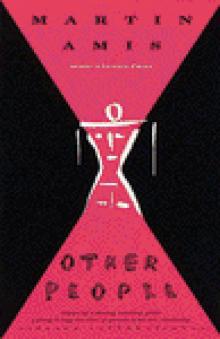 Other People
Other People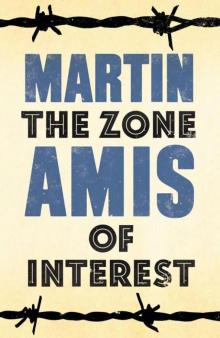 The Zone of Interest
The Zone of Interest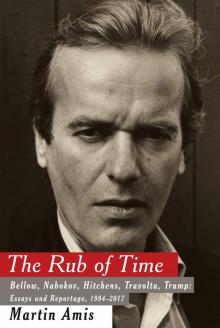 The Rub of Time: Bellow, Nabokov, Hitchens, Travolta, Trump
The Rub of Time: Bellow, Nabokov, Hitchens, Travolta, Trump Koba the Dread
Koba the Dread Success
Success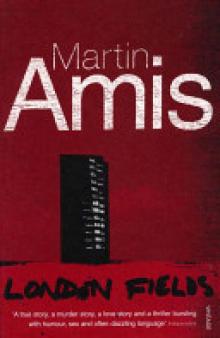 London Fields
London Fields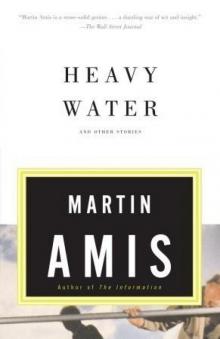 Heavy Water: And Other Stories
Heavy Water: And Other Stories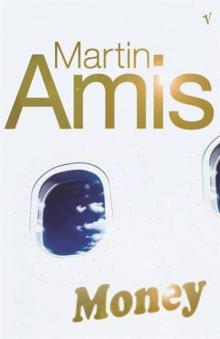 Money
Money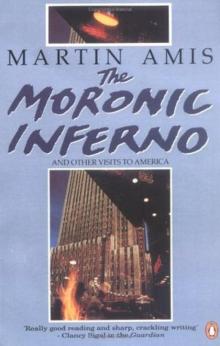 The Moronic Inferno and Other Visits to America
The Moronic Inferno and Other Visits to America Yellow Dog
Yellow Dog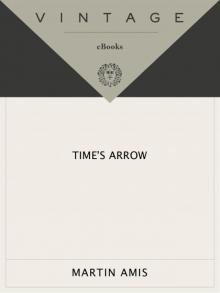 Time's Arrow
Time's Arrow Experience: A Memoir
Experience: A Memoir Einstein's Monsters
Einstein's Monsters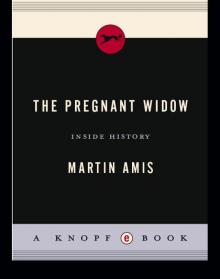 The Pregnant Widow
The Pregnant Widow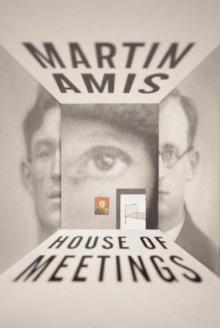 House of Meetings
House of Meetings The Information
The Information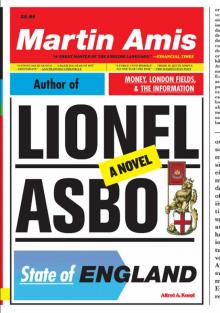 Lionel Asbo: State of England
Lionel Asbo: State of England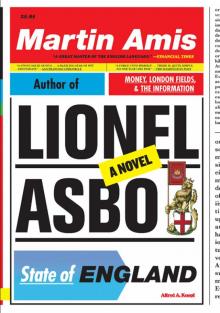 Lionel Asbo
Lionel Asbo Heavy Water and Other Stories
Heavy Water and Other Stories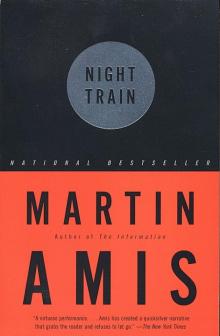 Night Train
Night Train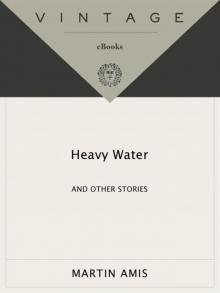 Heavy Water
Heavy Water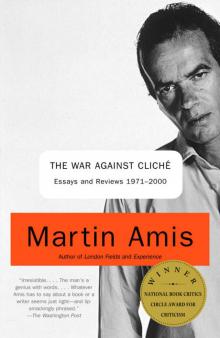 The War Against Cliche: Essays and Reviews 1971-2000 (Vintage International)
The War Against Cliche: Essays and Reviews 1971-2000 (Vintage International)